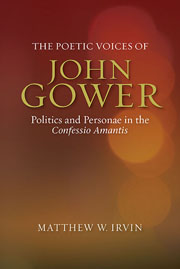Book contents
- Frontmatter
- Contents
- Dedication
- Acknowledgements
- List of Abbreviations
- Introduction: Making and Doing Love
- 1 The Inheritance of the Confessio Amantis
- 2 The Orientation of the Prologue to the Confessio Amantis
- 3 Amorous Persons
- 4 Pity and the Feminine
- 5 Labor and Art
- 6 Alienation and Value
- 7 The Love of Kings
- Conclusion: Identifying Amans
- Bibliography
- Index
- VOLUMES ALREADY PUBLISHED
6 - Alienation and Value
Published online by Cambridge University Press: 05 March 2014
- Frontmatter
- Contents
- Dedication
- Acknowledgements
- List of Abbreviations
- Introduction: Making and Doing Love
- 1 The Inheritance of the Confessio Amantis
- 2 The Orientation of the Prologue to the Confessio Amantis
- 3 Amorous Persons
- 4 Pity and the Feminine
- 5 Labor and Art
- 6 Alienation and Value
- 7 The Love of Kings
- Conclusion: Identifying Amans
- Bibliography
- Index
- VOLUMES ALREADY PUBLISHED
Summary
Genius' attempt to ground the lover's virtue on gentilesse reveals the alienation inherent in the lover-persona. While an account of noble virtue should entail an understanding of the proper place of the person in relationship to the common good and the structure and hierarchy of rule, Genius abstracts virtue from its political context, explicating it only as the pre-requisite for the “art” of love. While throughout much of the first three books Genius, superficially at least, has been an unchallenged authority, Books IV and V are characterized by increasing problems with Genius' ability to rationalize erotic love as virtue, and the nature of the concupiscent desire that lies at the heart of that rationalization. Genius' rationalizing scheme has been primarily analogy; this will come to a critical moment in the discussion of Avarice, for this “omniorum malorum radix” (root of all evils; CA V.8marg.) is itself unmistakably analogous to erotic desire, fin amour's over-valuation of both its object and its practice being essential to its very being. Throughout the Confessio, Genius has been able to shore up problems involving the economy of desire through promising the intervention of grace. He has acted much like the daughters of Avarice and the avaricious lawyers in the Mirour de l'Omme and the Vox Clamantis, using artful language to turn the laws (here the laws of both art and nature) against the common good, and encouraging instead private, alienated possession.
- Type
- Chapter
- Information
- The Poetic Voices of John GowerPolitics and Personae in the Confessio Amantis, pp. 192 - 226Publisher: Boydell & BrewerPrint publication year: 2014

